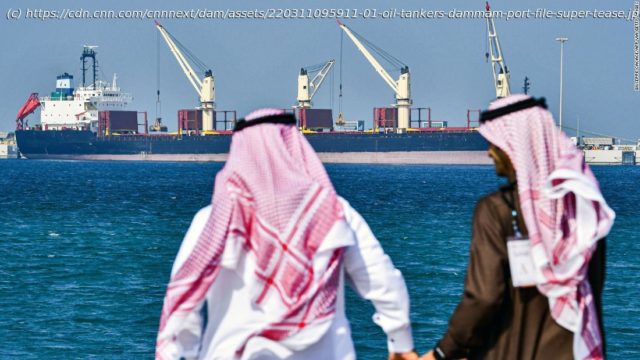The UAE suggested that it may support an increase in oil output within the framework of OPEC+. We ask energy expert Amena Bakr how likely that is to happen.
Yousef Al Otaiba, the UAE ambassador in the United States, told CNN his country favors an oil output hike. It was the first indication from a member of the OPEC+ cartel of oil producers that a supply increase beyond what was agreed by the group could be considered. OPEC+ had refused to budge from its current plan to gradually ramp up output. OPEC+ is a group of 23 oil producing countries, including Russia, that coordinates oil policies which have a role in determining prices on the market. Western nations have placed sanctions on Moscow’s energy exports in response to its invasion of Ukraine. That could lead Russia’s seaborne oil exports to shrink to a third of their level before the invasion, estimated Energy Intelligence, an energy information company. The move could potentially drive the price of a barrel even higher as the West grapples with high inflation. The Gulf nations of UAE and Saudi Arabia are the only countries in OPEC+ with enough spare oil production capacity to add to the market, but they had rebuffed calls to pump more crude — until Wednesday. Brent crude fell 13% on Otaiba’s comments, the biggest one-day drop in almost two years. Then, at 2 a.m. local time, UAE energy minister Suhail al-Mazrouei took to Twitter to clarify. «The UAE is committed to the OPEC+ agreement and its existing monthly production adjustment mechanism,» he said. Oil prices rebounded. The fluctuation shows how volatile the market is, said Amena Bakr, chief OPEC correspondent at Energy Intelligence. «Any signaling can move the price in either direction,» she said. «If, like the ambassador mentioned, the UAE favors an increase in production, perhaps that’s going to be discussed at the coming meeting on March 31.» We asked Bakr how likely that is to happen, and if it will make a difference to the price of oil. Why are oil prices going up and what can OPEC+ do about it? At this point OPEC+ is playing the fundamentals card. They’re saying there is no actual shortage of supply in the market. We’re seeing oil prices rise to over $130 [per barrel], all on the back of the war between Russia and Ukraine. So it’s due to geopolitical tension, which the group can’t control at all. Do you believe them? To some extent, yes, because there’s a huge geopolitical premium. Prior to the war, [that premium] was already high. Now I’d say there’s a premium of over $30 [per barrel]. So, I do believe that there’s a huge part of this equation that OPEC+ can’t control. But at the same time, it’s very, very important, especially for Saudi Arabia, to keep Russia united with OPEC+ and they don’t want to introduce a policy that is going to cause Russia to step out. They see this organization as the only way they can manage the market into the future. They want to stay united until they can figure out how much of a shortage there is in Russian exports. And then they can act based on that. How much spare production capacity does OPEC+ have? [Spare] capacity within the group now is held by two countries: Saudi Arabia and the UAE. Saudi Arabia has spare capacity of around 2 million barrels a day.






